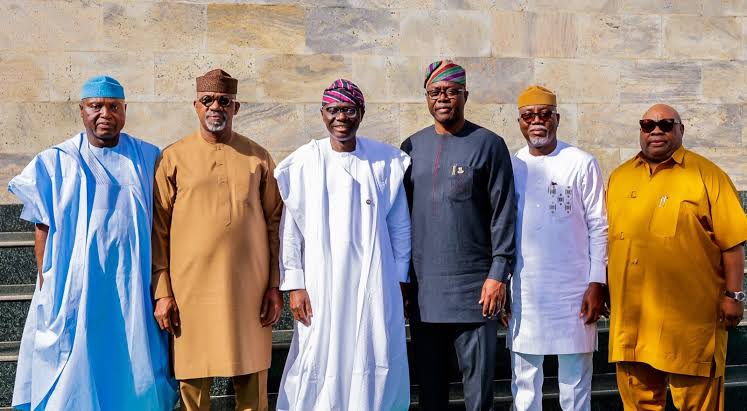Daud Olatunji
Despite receiving a staggering N224.1 billion as federal allocation between January and February 2025, the six states in the South-West region — Lagos, Ogun, Oyo, Osun, Ondo, and Ekiti, continue to grapple with mounting public frustration over dilapidated infrastructure, hunger, and deteriorating living conditions.
PLATFORM TIMES reports that an analysis of disbursement data obtained from BudgIT, a civic-tech organization, shows that the six states collectively received N111.4 billion in January and N112.7 billion in February, yet the streets tell a different story — one of despair, failing public services, and an increasingly restless populace.
PLATFORM TIMES further reports that the breakdowns of the Federal Allocations show that Lagos State, Nigeria’s economic capital, emerged as the highest recipient with N84.03 billion over the two months — N38.88 billion in January and N45.14 billion in February.
Despite this, residents of many parts of the state continue to lament poor road networks, rising food costs, and overcrowded healthcare facilities.
Oyo State followed Lagos state with a total of N30.63 billion — N13.68 billion in January and N16.95 billion in February.
Several communities in the state are reportedly battling with poor drainage systems and inaccessible rural roads, even as prices of basic food items soar.
Ondo State received a total of N28.05 billion — N12.61 billion in January and N15.44 billion in February. Public outrage is growing in parts of Akure and other urban centres over abandoned projects and epileptic electricity supply.
Osun State collected N20.29 billion, comprising N9.01 billion in January and N11.28 billion in February. Yet, many public schools remain underfunded, with teachers complaining about salary delays and poor learning environments.
Ekiti State received N18.51 billion in the two months — N8.66 billion in January and N9.84 billion in February.
In spite of this, road infrastructure remains visibly crumbling across many local government areas, while smallholder farmers decry the rising cost of inputs.
Ogun State, which got N18.07 billion — N8.56 billion in January and N9.51 billion in February — is facing similar challenges.
Residents in communities such as Ifo, Ado-Odo, and parts of Abeokuta have decried the worsening traffic conditions and the state of public health centres.
The cumulative allocation for all six states in the region over the two-month period stands at N224,045,121,820.12.
Despite this influx of funds, civil society groups and public policy analysts argue that the impact on citizens’ lives remains negligible.
Speaking with PLATFORM TIMES, a civil rights advocate and public finance analyst, Banji Adediran, expressed dismay at what he described as “a classic case of revenue without responsibility.”
“How can over N224 billion be disbursed to just six states in two months and yet people are still cooking with firewood, sleeping in darkness, or traveling on pothole-ridden roads?” he queried.
“Governors in the South-West must explain where this money is going.”
In many markets across the region, the rising cost of garri, rice, beans, and other staples continues to bite hard.
Traders in Lagos, Abeokuta and Ibadan lamented that sales have dropped significantly due to a fall in purchasing power.
Stakeholders are now calling for greater transparency in budget implementation and citizen-inclusive governance.
BudgIT, in its latest fiscal responsibility brief, urged state governments to publish detailed spending reports and project trackers, especially as the hardship bites harder nationwide.
In addition, some residents have taken to social media to demand audits of the monthly allocations received by state governments, with the hashtags #WhereIsTheMoney and #TrackTheFunds gaining traction.
While the Nigerian government continues to tout fiscal federalism as a strength of the democratic system, many citizens are left wondering why their quality of life does not reflect the billions funneled into state coffers.
With over N224 billion disbursed in just 60 days, questions continue to mount: Where is the money going, and when will the people of the South-West begin to feel its impact?
For now, the disconnect between allocation and visible development remains a source of growing anger in a region historically known for its political awareness and civic engagement.
Do you want to share a story with us? Do you want to advertise with us? Do you need publicity for a product, service, or event? Contact us on WhatsApp +2348183319097 Email: platformtimes@gmail.com
We are committed to impactful investigative journalism for human interest and social justice. Your donation will help us tell more stories. Kindly donate any amount HERE




